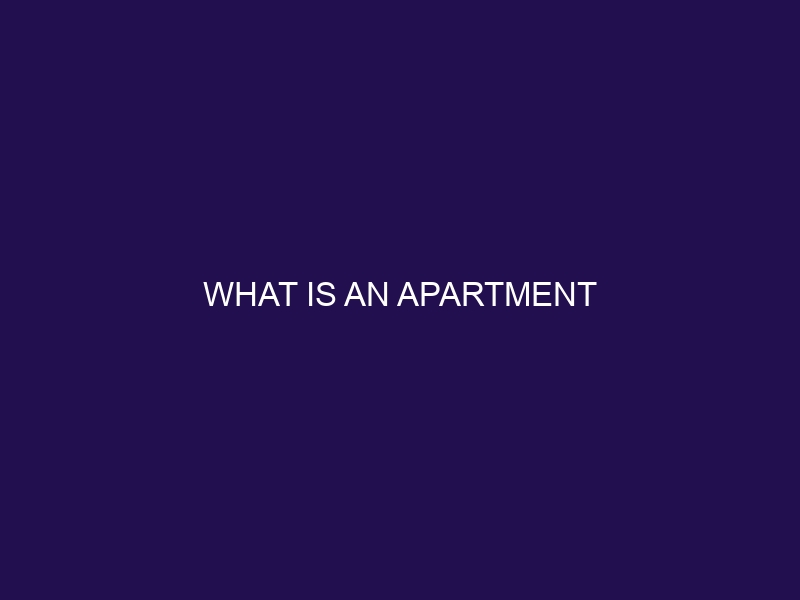What is an Apartment
An apartment is a self-contained living space that is part of a larger building or complex. It is typically a rented space where individuals or families can reside. Apartments offer a range of amenities and facilities, and they come in various sizes and layouts to cater to different needs. Understanding the concept of an apartment and its different types is important before deciding to rent one.
There are several types of apartments available, including:
- Studio Apartment: A compact unit that combines living, sleeping, and kitchen areas into a single open space.
- One-Bedroom Apartment: Consists of a separate bedroom, a living area, a kitchen, and a bathroom.
- Two-Bedroom Apartment: Provides two separate bedrooms, a spacious living room, a kitchen, and one or more bathrooms.
- Penthouse Apartment: A luxurious apartment situated on the top floor of a building, often offering scenic views and additional amenities.
- Loft Apartment: Converted from commercial or industrial buildings, featuring high ceilings and open floor plans.
Living in an apartment has its advantages, including affordability compared to owning a house, low maintenance responsibilities, and access to various amenities such as gyms, pools, and security services. However, there are also disadvantages to consider, such as potential lack of privacy, limited space, and noise levels that may be a concern for some individuals.
Before renting an apartment, there are important factors to consider. Location is crucial, as it determines accessibility to amenities, transportation, and proximity to work or school. Budget is another vital consideration, as rent and additional expenses should align with individual financial capabilities. Amenities and facilities provided by the apartment complex should be evaluated based on personal preferences. Lastly, understanding the terms and conditions of the lease agreement is essential to ensure a smooth rental experience.
By understanding what an apartment is, its types, pros and cons, and the necessary considerations, individuals can make informed decisions when choosing an apartment that suits their needs and preferences.
What is an Apartment?
What is an Apartment? An apartment is a self-contained living space within a larger building that is typically rented out to individuals or families. It is a private residence that usually includes a kitchen, bathroom, and one or more bedrooms. Apartments can vary in size and layout, from small studios to spacious multi-bedroom units. They offer a convenient and affordable housing option for those who don’t want the responsibilities of homeownership. Apartments provide a sense of community and often come with amenities like gyms, pools, and parking lots. Apartments are designed to provide comfortable and convenient living spaces for individuals and families.
Types of Apartments
When it comes to apartments, variety is the spice of life. Get ready to discover a world of living spaces in our exploration of different types of apartments. From cozy studio apartments to luxurious penthouses, we’ll cover it all. Each sub-section will unveil the distinct charms and features of these diverse dwelling options. So, let’s embark on a delightful journey through the enchanting realm of apartments and uncover the unique characteristics that make them perfect for different lifestyles.
Studio Apartment
A studio apartment is a great choice for individuals or couples who prioritize convenience and affordability. It combines a bedroom, living room, and kitchen into a single open area, making it an ideal compact living space.
- Space: Studio apartments typically range from 300 to 600 square feet, offering a cozy living environment.
- Affordability: Due to their smaller size, studio apartments usually have lower rent prices compared to larger units.
- Flexibility: The open layout of a studio apartment allows for easy customization and organization to suit personal tastes and needs.
- Low maintenance: Cleaning and maintenance in a smaller space like a studio apartment are relatively easy and require less time and effort.
- Cost-saving: Choosing a studio apartment can lead to lower utility bills and other expenses, contributing to significant cost savings.
One-Bedroom Apartment
- Space: One-Bedroom Apartments are typically smaller than larger units, making them ideal for individuals or couples.
- Layout: Depending on the floor plan, One-Bedroom Apartments may have a separate bedroom or an open concept design.
- Affordability: One-Bedroom Apartments are often more affordable compared to larger units, making them great for those on a budget.
- Privacy: With a dedicated bedroom, One-Bedroom Apartments offer more privacy compared to studio apartments.
- Flexibility: The smaller size of One-Bedroom Apartments allows for easy maintenance and cleaning.
- Sarah, a recent college graduate, found a cozy One-Bedroom Apartment in the city. It was perfect for her needs, providing a comfortable space to call her own as she embarked on her new career.
Two-Bedroom Apartment
A two-bedroom apartment, also known as a two-bedroom flat, is a highly sought-after option for small families, roommates, or individuals in need of extra space. When considering two-bedroom apartments, there are several key points to take into consideration:
1. Size and Layout: Two-bedroom apartments typically provide a larger living area compared to smaller units. This allows for more space to accommodate furniture and personal belongings, making it an ideal choice for those who value comfort and ample room.
2. Flexibility: The additional bedroom in a two-bedroom apartment offers great flexibility. It can be used as a guest room, a home office, or even as a playroom for children. This versatility makes it appealing to those who desire multifunctional living spaces.
3. Privacy: One of the major advantages of a two-bedroom apartment is the increased privacy it offers. With two separate bedrooms, occupants can enjoy more personal space, making it a preferable option over a one-bedroom or studio apartment.
4. Value: Two-bedroom apartments often provide more value for your money. They strike a good balance between cost and space, giving you the opportunity to enjoy a comfortable and spacious living environment without breaking the bank.
5. Resale Potential: Two-bedroom apartments tend to have better resale potential due to their versatility and attractiveness to a wider range of buyers. Whether it’s young professionals, couples, or small families, these apartments have broad appeal in the real estate market.
Consider these key points when searching for the perfect two-bedroom apartment that meets your needs and lifestyle.
Penthouse Apartment
A penthouse apartment, also known as a luxurious living space, can be found on the top floor of a building. These exquisite living spaces often offer breathtaking views and high-end amenities. With their spacious layouts and top-of-the-line finishes, penthouse apartments provide a truly exclusive experience. One of the highlights of these apartments is the private terraces or rooftop gardens, offering a sense of seclusion and tranquility. Indulge in the penthouse lifestyle with features like gourmet kitchens, spa-like bathrooms, and state-of-the-art technology. It’s important to note that penthouse apartments come with a higher price tag due to their desirable location and premium features. If you’re seeking the epitome of luxury and sophistication, a penthouse apartment is an excellent choice. Before renting one, carefully consider factors such as location, budget, and amenities to ensure it aligns with your preferences.
Loft Apartment
A loft apartment, also referred to as a loft, provides a distinctive and one-of-a-kind living space. Known for its open floor plan and industrial charm, a loft apartment offers an array of benefits. Let’s delve into the key features of living in a loft apartment:
- Spaciousness: A hallmark of loft apartments is their open layout, often with soaring ceilings and expansive windows. This design creates an airy and vast atmosphere, giving residents a feeling of freedom.
- Flexibility: With the absence of interior walls, loft apartments provide exceptional flexibility when it comes to arranging furniture and establishing multiple living areas. Residents can adapt the space to suit their individual needs and preferences.
- Industrial Appeal: Loft apartments frequently retain the industrial elements from their past, such as visible brick walls, exposed beams, and ductwork. These unique features add charm and style to the space, creating an aesthetically pleasing environment.
- Abundant Natural Light: Thanks to the large windows typically found in loft apartments, these homes are flooded with natural light. This abundance of sunlight creates a bright and welcoming living space, promoting a positive ambiance.
- Versatility: Loft apartments can be easily transformed into various living spaces to accommodate a range of needs. Whether used for residential purposes, workspaces, or a combination of both, loft apartments offer adaptability to suit different lifestyles.
Sarah, a talented freelance artist, skillfully converted her loft apartment into an expansive art studio. By harnessing the open floor plan and capitalizing on the ample natural light, she created a haven for her creative process. Through the seamless integration of her living and working spaces, Sarah’s loft apartment became an inspiring and productive environment for her artistic endeavors.
Advantages of Living in an Apartment
Living in an apartment comes with numerous advantages that make it a desirable option. From affordability to low maintenance and access to amenities, this section explores the various benefits that apartment living provides. Discover how apartments offer a cost-effective housing solution, requiring less upkeep and providing convenient amenities to enhance your daily living experience. Say goodbye to high expenses and time-consuming chores, and unlock the advantages that come with choosing an apartment as your home.
Affordability
Living in an apartment can be an affordable housing option for many individuals. Here are some factors to consider regarding the affordability of apartments:
Considering these factors can help individuals assess the affordability of living in an apartment and make informed decisions about their housing choices.
Low Maintenance
Living in an apartment offers several advantages, one of which is the benefit of low maintenance. Here are some reasons why apartments require less upkeep:
- No Yard Work: Unlike houses, apartments typically do not have a yard that needs mowing, weeding, or landscaping.
- Exterior Maintenance: The responsibility of maintaining the building’s exterior, such as cleaning common areas or repairing the roof, falls on the landlord or property management, not the tenant.
- Shared Amenities: Apartments often come with shared amenities like fitness centers, pools, or laundry facilities, which tenants can use without the worry and hassle of maintenance.
Apartments have been favored for centuries due to their inherent advantage of low maintenance requirements. In ancient Rome, for example, apartment buildings called insulae were constructed to accommodate the growing population. These multi-story structures offered convenience and allowed individuals to focus on other aspects of their lives without the burden of extensive maintenance. This trend of low-maintenance living in apartments has continued to this day, making them a popular housing choice for many.
Amenities
Living in an apartment comes with various amenities that enhance convenience and comfort. When choosing an apartment, it is important to consider the following amenities:
| – On-site fitness center: | Experience the convenience of working out without the need for a gym membership. |
| – Swimming pool: | Enjoy a refreshing dip or relax by the poolside during hot summer days. |
| – Laundry facilities: | Save time and effort by having access to laundry facilities within the apartment complex. |
| – Parking: | Look for apartments that offer dedicated parking spaces or covered parking options. |
| – Security: | Ensure that the apartment complex has security measures such as surveillance cameras or a gated entrance for peace of mind. |
According to a survey, 83% of apartment renters consider amenities an important factor when choosing their living space.
Disadvantages of Living in an Apartment
Living in an apartment comes with its own set of challenges that can affect our daily lives. From limited space to noise levels, we’ll explore the downsides of apartment living. Get ready to uncover the lack of privacy, cramped spaces, and the constant nuisance of noise that can make apartment living less than ideal. Prepare to dive into the realities of apartment life that might just make you reconsider your living preferences.
Lack of Privacy
Living in an apartment can have its drawbacks, and one major concern that individuals often have is the lack of privacy. It’s important to consider the following points when it comes to this issue:
- Proximity: Apartments are usually built close together, meaning neighbors are just a wall away. This close proximity makes it easy to hear noise, whether it’s from conversations or activities.
- Shared spaces: Common areas such as hallways, laundry rooms, and elevators further add to the potential for encounters with other residents, compromising your privacy.
- Security concerns: With shared entrances or common areas, there may be a higher risk of unauthorized access to your living space, which can contribute to the lack of privacy.
- Lack of outdoor privacy: Balconies or windows facing other apartments may limit your ability to enjoy personal outdoor space without feeling exposed to the eyes of others.
To mitigate these concerns and address the lack of privacy, you can consider the following:
- Choosing an apartment with thicker walls or soundproofing materials can help minimize the transfer of noise and increase your privacy.
- Implementing room dividers or curtains within your living space can create separation and provide you with more privacy.
- Seeking apartments on higher floors can help minimize noise from neighbors below or street noise, giving you a greater sense of privacy.
Limited Space
Living in an apartment with limited space can be challenging, but there are ways to make the most out of it. By implementing smart storage solutions like shelves, wall-mounted storage options, under-bed bins, hanging organizers, and closet organizers, you can maximize vertical space and keep clutter to a minimum. Additionally, choosing furniture that serves multiple purposes, such as a sofa bed or ottoman with hidden storage, can help optimize functionality. Creating designated areas for different activities further enhances the use of limited space. With these strategies in place, you can effectively utilize the space in your apartment, making it feel more spacious, organized, and accommodating.
Noise Levels
- Consider Living in an apartment can present challenges, especially when it comes to noise levels. It is important to take into account the potential noise from external factors such as busy roads, construction sites, or nearby entertainment venues that may contribute to higher levels of noise disturbance.
- Building Design and Soundproofing: Another crucial factor to consider when choosing an apartment is the building design. It is worth investigating the construction materials used and whether there are any soundproofing measures in place to minimize noise transfer between units. This can greatly contribute to a quieter living environment.
- Neighborhood Noise: Researching the neighborhood is essential to determine if it is known for being noisy or if there are ongoing noise issues. Being aware of any potential noise concerns in the area can help you make an informed decision.
- Optimal Apartment Layout: When selecting an apartment, it is wise to opt for a layout that places bedrooms away from common areas or noisy neighbors. This can significantly reduce the impact of noise disturbances on your quality of life.
To accurately evaluate the noise levels, it is recommended to visit the apartment at different times of the day. Additionally, reading reviews from past tenants can offer valuable insights regarding the noise levels and overall living experience in the apartment.
Things to Consider Before Renting an Apartment
Before diving into the details, let’s take a moment to consider the crucial factors when it comes to renting an apartment. We’ll explore the importance of location, budget, amenities, and the lease agreement. Each sub-section holds valuable insights that can significantly impact your apartment hunting journey. So, buckle up and get ready to navigate the rental market armed with the knowledge you need to find your perfect home.
Location
The location of an apartment is an essential factor to consider when renting a place to live. The right location can significantly influence your daily life and overall satisfaction with your living situation. Here are some crucial points to consider when evaluating the location of an apartment:
1. Proximity to amenities: It is important to look for an apartment that is conveniently located near grocery stores, restaurants, schools, and public transportation options.
2. Safety: Before making a decision, it is important to research the crime rates and general safety of the neighborhood. Check for well-lit streets, security measures, and a low crime rate.
3. Commute: Take into account the proximity of the apartment to your workplace or school. A shorter commute can save you time and reduce stress.
4. Noise levels: Make note of the surrounding environment and potential sources of noise, such as busy streets, nightlife venues, or construction sites.
5. Future development: Conduct research on any upcoming projects or developments in the area that could potentially impact your quality of life or property value.
By carefully assessing the location of an apartment, you can ensure that it aligns with your lifestyle, preferences, and needs.
Budget
Considering your budget is crucial when looking for an apartment. It is essential to determine how much you can afford to spend on rent each month and to weigh that against your other expenses. When creating a budget for renting an apartment, don’t forget to include additional costs like utilities, parking fees, and maintenance fees. Finding a balance between affordability and the amenities and features you desire is important. By carefully considering your budget, you can ensure that you find an apartment that meets your needs without straining your finances.
Pro-Tip: Establish a realistic budget for your apartment search and stick to it to avoid financial stress in the long run.
Amenities and Facilities
When considering an apartment, amenities and facilities play a vital role in determining the overall living experience. Here is a comprehensive list of essential amenities and facilities to consider:
- Security: Pay attention to apartments that offer 24/7 security systems, surveillance cameras, and gated access for an extra sense of security.
- Parking: Make sure to inquire about the availability of sufficient parking spaces in the apartment complex, including whether they are covered and if there are any additional fees.
- Gym and Fitness Center: For those who value an active lifestyle, having an on-site gym or fitness center can provide convenience and cost-effectiveness.
- Swimming Pool: Particularly in warmer climates, the presence of a swimming pool in the apartment premises can be an excellent way to relax and cool down.
- Laundry Facilities: Access to laundry facilities within the building can save time and effort by eliminating the need to visit a laundromat.
- Community Spaces: Apartments that offer communal areas like rooftop gardens, BBQ areas, or lounges foster a sense of community and provide additional spaces for socializing.
Having these amenities and facilities greatly enhances the quality of living in an apartment, transforming it into a true home away from home.
True story: I once resided in an apartment complex that featured an extraordinary rooftop terrace with breathtaking city views and a fantastic BBQ area. This spot quickly became a favorite gathering place for friends and neighbors, creating unforgettable memories. The additional amenities and facilities truly enhanced the overall apartment living experience, making it both enjoyable and convenient.
Lease Agreement
When renting an apartment, a lease agreement is the key document to consider. Here are some vital steps to follow:
- Thoroughly read the lease agreement to fully comprehend the terms and conditions.
- Determine the lease length, whether it is a fixed term or month-to-month.
- Verify details such as rent amount, due date, and late payment penalties.
- Inspect any restrictions on pets, guests, or modifications to the apartment.
- Familiarize yourself with the security deposit requirements and conditions for its refund.
- Take note of the tenant and landlord’s respective maintenance or repair responsibilities.
- Carefully consider the termination clauses and the lease renewal process.
- If any terms are unclear or require further explanation, ask questions and seek clarification.
- Ensure both parties sign the agreement and retain a copy for future reference.
Frequently Asked Questions
What is an apartment?
An apartment is a self-contained housing unit that is part of a building. It can also be referred to as a flat or unit. Apartments can vary in size and amenities, but they typically include living spaces, bedrooms, a kitchen, and a bathroom. They can be found in purpose-built buildings or divided sections of older houses.
What is the difference between an apartment and a flat?
The term “apartment” is commonly used in North America, while “flat” is more common in the UK. However, both terms refer to the same type of self-contained housing unit that is part of a larger building.
What is a mixed-use building?
A mixed-use building is a building that combines both commercial and residential uses. This means that there are businesses on the lower floors and residential units on the upper floors. Mixed-use buildings provide convenience and a variety of amenities for residents, as they often have shops, restaurants, or offices within the same building.
What is the housing tenure of apartments?
The housing tenure of apartments can vary. It ranges from large-scale public housing, where the government provides subsidized housing for low-income individuals and families, to owner occupancy in a condominium, where individuals own their units and share ownership of common areas with other unit owners. Apartments can also be rented from a private landlord or through housing cooperatives.
What are the benefits of living in an apartment complex?
Apartment complexes offer various benefits, such as round-the-clock security, maintenance services, and access to amenities like manicured green spaces, recreational areas, and communal dining rooms or gardens. They can also provide a sense of community and convenience, as many complexes have resident welfare associations and shared amenities.
Are apartments a good investment option?
Apartments can be a good investment option, especially in areas where there is a high demand for rental units or in locations with potential for property value appreciation. However, like any investment, it is important to consider factors such as location, market conditions, maintenance charges, and potential rental income before making financial decisions.







